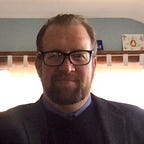Notes on the Nature of Infirmity
I’m currently sitting on the bed in my room at NYP Columbia, looking out at the Hudson River on the 4th of July. Things, transplant-wise, have accelerated rather quickly and I’m now being treated on an inpatient basis while I wait for a new heart. So room 546 on the Cardiac Care Unit is my new home for the forseeable future. More details on that in a later edition, though.
In my last installment, you may recall, I dug through my attic and, eventually, found a copy of a personal essay I wrote at the time of my initial diagnosis. The essay is not good, but it has its moments. And what fun to be able read it today and to remember things accurately. Or, at least as accurately as possible. I definitely put a gloss on the story when I wrote it, to make it more dramatic. Or I changed the order of events to fit my desired narrative structure. Or added any number of other possible embellishments. But some of it, especially the dialogue, offers a fascinating (at least to me) view into one of the most significant events of my life.
There is a recounting of a conversation with my dad, for example, that reads as very authentic. I can hear both of our voices clearly in the text. There are observations of life in the hospital that reveal the writer I was trying to become. There are descriptions of the patients I shared my room with that are often touching or funny. Many of these moments have been gone from my memory for 25 years. I haven’t thought about most of the people I shared my hospital room with since I was there, so when I read the essay today, my brain fills with remarkably accurate memories of people and events that have over time faded into vapor.
As for the conversation with my dad, I can read my recounting of it today and see that it was, in fact, a crucial moment in my relationship with him. It is remarkable to read it now and be able to recognize the precise moment that everything changed.
We’d had a fraught relationship for many years. Dad is a serious Type A; ambitious and driven, industrious and intense. I’ve never been any of those things and at 24, I didn’t even pretend. I drifted around after graduation. I went back east and then moved to the west coast to live on the property of a friend’s mother. I worked as a laborer on construction site, in restaurants, and, for about a week, in a chocolate factory.
I lived in an old Airstream Trailer. Not one of those shiny, fancy ones, but a damp and leaky one, propped up on cinder blocks under a giant cedar and covered with a coating of green moss. I think it bothered dad that, after four years of education, I still really had no idea what I wanted to do besides “be a writer.” Of course, to be a writer, you actually have to write. I did a lot more drinking than I did writing. I finally got my act together and, at least partially on dad’s advice, decided to apply to grad school. That’s how I ended up at the University of Iowa.
I loved Iowa City. For starters, it was where I met my wife, Laura. I felt a combination of freedom and maturity there I’d never felt before. As a master’s student, I was committed to my work in a way I never was as an undergrad, but still young enough be spontaneous and drive out into the countryside with Laura to lie in the bed of my truck and stare up at the endless stars or waste an afternoon in Dave’s Fox Head, a proper dive bar, drinking two dollar beers and shooting pool, maybe with a local mechanic or maybe with the next National Book Award winner.
I was not part of the famous Writer’s Workshop program. I was pursuing a master’s degree in journalism. I now question the utility of paying a giant university a lot of money to learn something you can really only learn by doing. But being at the university forced me to write, a lot. I wrote my personal essay for a class I took outside the journalism program, as part of a graduate seminar in the English Department.
I gave the essay a title, “Notes on the Nature of Infirmity,” that somehow manages to be both grandiose and corny as hell. I had no idea at the time what it meant, in the long term, to get a diagnosis of ARVD. In hindsight, as I sit waiting for a transplant, it is remarkable how cavalier I was about the whole thing. But dad was not cavalier at all, he recognized immediately that he’d nearly lost his son.
I wrote at the time that I saw “genuine fear in his eyes” and that it looked to me like he hadn’t slept. “You gave us a real scare last night, Andrew,” he told me. “Mom answered the phone,” he said about the 4:00 a.m. phone call from my girlfriend, who they may not have even known about. “She just kept gasping and I was asking her ‘what is it Mary? What is it?’ and when she told me it was a heart problem, well, I just couldn’t believe it.”
The rest of the conversation unfolded in what was fairly typical fashion for us, a pattern I recognized by noting in the essay that “my family can deflect the gravity of any situation by letting conversation slip into the ridiculous.” But, reading the piece now, I keep returning to our first conversation after he arrived and the memory is so vivid. I recognize it now as the moment our relationship changed from something tense and often difficult into something closer to what it always should have been.
